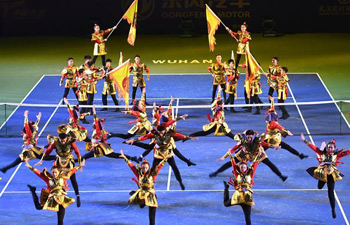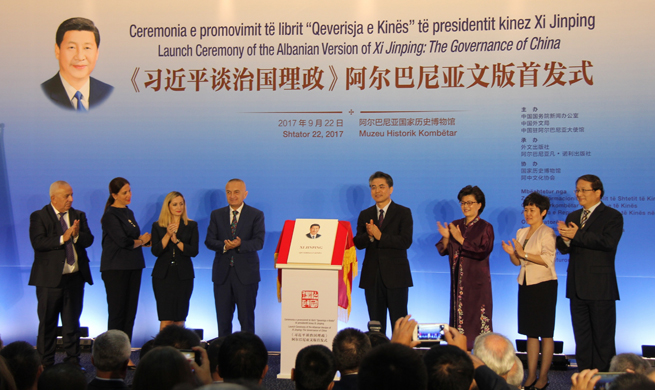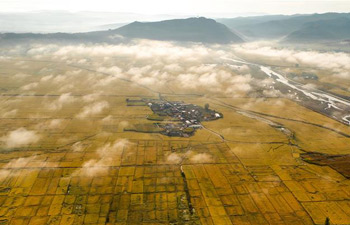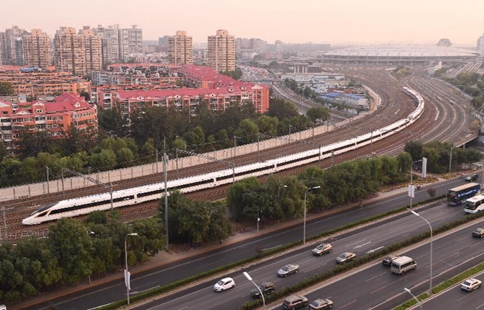BERLIN, Sept. 24 (Xinhua) -- As widely expected, Angela Merkel's conservative CDU/CSU bloc has again won the most votes in the German federal election on Sunday, but she needs to reflect what's behind her bitter victory.
According to preliminary survey, the conservative CDU/CSU bloc won 32.5 percent of the total votes, falling short of expectations with a 9-percentage-point gap compared with the election four years ago. Its major rival, the Social Democratic Party (SPD) won only 20 percent.
But the biggest surprise is made by the far-right populist Alternative fuer Deutschland (AfD), which won 13.5 percent of votes and entered the Bundestag for the first time as a far-right party.
"The result showed that the next German government will face challenges," Hajo Funke, a professor from Free University Berlin, told Xinhua.
Funke said to some degree the result is a reflection of the partly failure of the grand coalition government between the Union Party and the SPD in the past four years, mostly in domestic issues, as the government failed to address enough the divide between the rich and poor.
Although German economy is booming and enjoying some of the best times since 2008/2009 global financial crisis, the gap between the rich and the poor is increasing. According to a survey by German media, social justice has become the second social problems in the country, just after the refugee issues.
Not only wealth gap between the rich and the poor, but also between different regions. According to the newspaper Bild, about 27 percent of male voters in eastern Germany cast their ballots for the AfD, the highest ratio among all parties. Eastern Germany is the most less developed regions.
"The prices are climbing, the rent is increasing, but our salaries are increasing as quickly as living costs," said the 52-year-old repair worker Stephen Norman in Berlin, who voted for AfD.
"I'm heavily taxed, and all Germans are heavily taxed, but we don't want to use our money to support refugees. That is unfair!" Norman told Xinhua.
"We lost so many voters because they dissatisfied with CDU's policy, such as the refugee policy. But they switched to AfD not because they believed that AfD can provide solutions, but an expression of their dissatisfaction to us," Andreas Quebbemann, member of the state parliament in Niedersachsen told Xinhua.
Many AfD supporters also believed that although they don't disagree that if Muslim people live as their neighbors, but if millions of Muslim immigrants come to Germany the country will fall apart.
In addition, some of them believed that all of other German parties were converging. They supported the AfD only because they want a different party.
Funke said those problems need the new government to solve with more efforts, especially caring more about children, the poor and other people becoming marginalized in a bid to curb social insecurity feelings in a booming economy.
As Merkel said after the election, she will try to win back all AfD supporters "with good policies."
Although refugee crisis has passed its peak, it is as some media has called the Achilles' Ankle for Merkel. Germany managed to handle the social and economic impacts brought by over one million of refugees, but it is true that some terrorists also entered Germany and launched a series of attacks here.
Experts believed that the new government need to take into consideration of the people that have been affected by immigrants the most, and protect legal immigrants by fighting against illegal ones and making more effective policies to send failed asylum seekers back home
However, as a coin has its two sides, the election result also showed some positive signs for future.
Having served as German Chancellor for 12 years, Merkel has dealt with an array of crises, from the financial crisis in 2008/2009, to the Euro-crisis and the most recent refugee crisis, but she managed to deal with them without leaving a Germany and perhaps the EU as a whole in chaos.
Some voters believed that in a world full of uncertainties, Merkel may continue to maintain Germany stability. Even among those who did not like her, some thought that maybe Merkel was not the best choices, but there was no other alternative compared to her competency.
That's why Merkel could win in the election, according to Funke.
"Merkel is an experienced crisis manager who takes Germany as a mother of the nation. This is something that meets the security needs of the Germans," said Dr. Oskar Niedemayer, professor with Free University Berlin.
"So, for many voters, why should I change the horses in such a crippling situation?" Niedemayer asked.

















